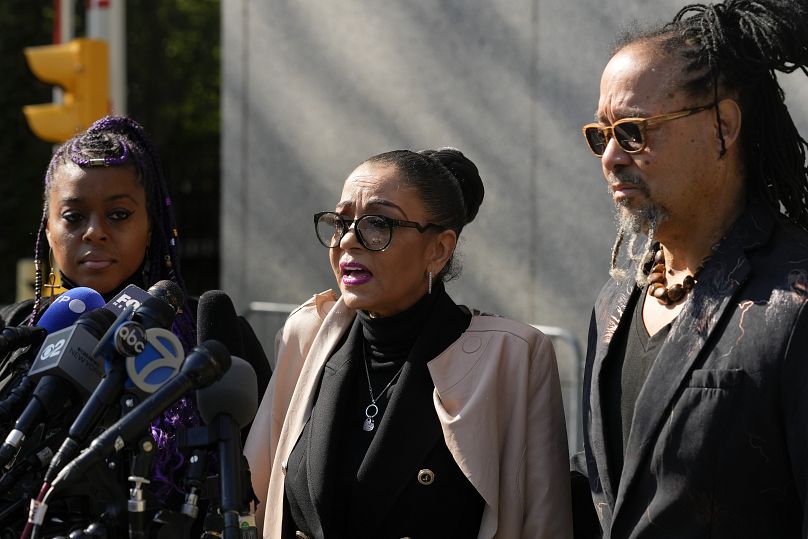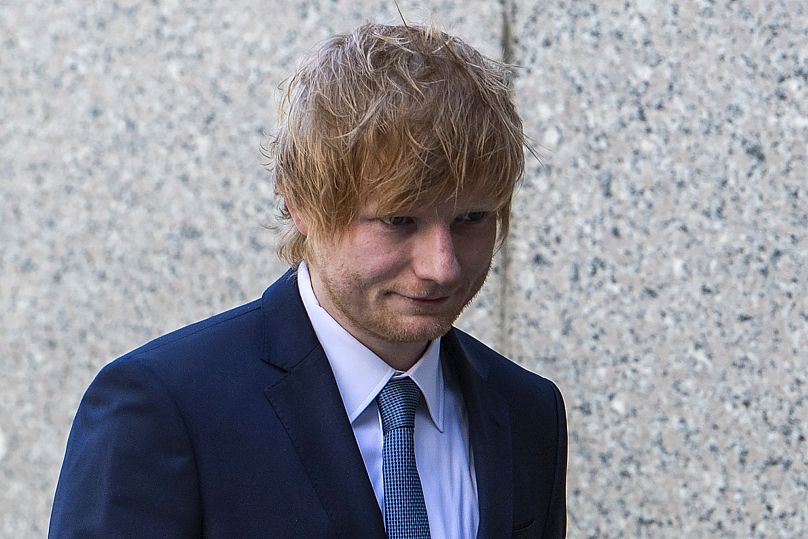Ed Sheeran has testified in a Marvin Gaye copyright suit this week. But what are the biggest plagiarism battles in recent music history?
Ed Sheeran has taken to the witness stand in a New York courtroom this week to deny allegations that his hit song 'Thinking Out Loud' plagiarized Marvin Gaye's 1973 soul classic 'Let's Get It On'.
Sheeran, 32, was called to testify on Tuesday 15 April in the civil trial by the heirs of Ed Townsend, Gaye's co-writer on the sexually charged slow jam. The family has accused the English star of violating their copyright, claiming his 2014 hit bore “striking similarities” to the famed Gaye track – released on his seminal thirteenth album 'Let’s Get It On’, which celebrates its 50th anniversary this year.
Sheeran was adamant that he had come up with the song himself. 'Thinking Out Loud' is one of the artist’s most popular tracks; it reached number one in the charts in 11 countries and has been played more than a billion times on YouTube.
His testimony was at times contentious, as he sparred during cross-examination with the plaintiff's attorney, Keisha Rice.
In response to video footage played in the courtroom that showed the musician segueing on stage between the two songs, Sheeran said it was “quite simple to weave in and out of songs” that are in the same key.
"You could go from Let it Be to 'No Woman, No Cry and switch back," Sheeran continued under oath, referring to the Beatles and Bob Marley classics.
“I’d be an idiot to stand on a stage in front of 20,000 people and do that,” Sheeran said about the accusation that he copied songs.
A lawyer for Townsend's heirs, Ben Crump, said the case was about “giving credit where credit is due” and told jurors that the merging of the two songs was tantamount to “a confession.”
“We have a smoking gun,” he said of the concert footage showing Sheeran flipping between the two songs.
Here are the songs. Blatant rip off or simply the case of a similar chord progression? You be the judge:
The lawsuit was filed in 2017 and the trial is expected to last up to two weeks. It comes as the singer is preparing to launch a North American stadium tour and release a new album.
A history of plagiarism accusations
This isn’t the first time that Ed Sheeran has faced plagiarism lawsuits.
In 2016, Sheeran was also part of a copyright lawsuit regarding the songwriting of his single ‘Photograph’. Songwriters Martin Harrington and Tom Leonard claimed it was too similar to the song 'Amazing', which they wrote for Matt Cardle, a winner of The X Factor. They sued Sheeran for $20 million.
The case was settled that April for an undisclosed amount, which Sheeran later admitted to feeling “dirty” about because it “opened the floodgates” for others to attempt similar lawsuits.
Last year, Sheeran won a court battle over his 2017 hit single 'Shape of You' after being accused of copying the 2015 song 'Oh Why' by Sami Chokri and Ross O’Donoghue. Chokri told the trial he felt “robbed” by the music star and was left shocked when he first heard 'Shape Of You' on the radio.
The judge said that while there were “similarities” between the one-bar phrase that repeats the words “Oh why” in Chokri’s song and the repetition of “Oh I” in Sheeran’s, such similarities are “only a starting point” for a copyright infringement claim, and there were “significant differences” between the phrases in the songs. The judge awarded Sheeran and his fellow songwriters $1.1 million in legal fees following their victory.
Recent plagiarism cases
Ed Sheeran’s case is far from an isolated one.
Here is a short rundown of the most notable musical plagiarism cases in recent years - with clips included, so you can weigh up the similarities for yourselves.
Artikal Sound System v. Dua Lipa
Last year, Dua Lipa was threatened by two reportedly expensive copyright lawsuits, both over her 2020 hit song (and genuinely one of the best pop songs of the last 10 years) ‘Levitating’.
Songwriters L Russell Brown and Sandy Linzer have alleged that the opening melody to the hit single is a “duplicate” of the melody to their 1979 song ‘Wiggle and Giggle All Night’ and their 1980 song ‘Don Diablo’.
The Florida-based reggae band Artikal Sound System also filed a suit last year claiming that ‘Levitating’ is close to their 2017 track ‘Live Your Life’.
These cases have not been argued yet.
Missy Elliot v. Bad Bunny
Bad Bunny’s 2020 song ‘Safaera’ on his sophomore album, 'YHLQMDLG', featured the same six-note from Missy Elliot’s fantastic 2001 tune ‘Get Ur Freak On’.
They came to an arrangement and now, Elliot gets 25% of the royalties from ‘Safaera’.
Marvin Gaye v. Robin Thicke and Pharrell Williams
In 2018, the estate of Marvin Gaye successfully sued Robin Thicke and Pharrell Williams over their 2013 song ‘Blurred Lines’. The jury agreed that song felt too much like Gaye’s track ‘Got to Give it Up’ and upheld a $5.3 million judgment against Thicke and Williams.
While extremely popular, 'Blurred Lines' was met with a considerable backlash at the time of its release because of its lyrics about sex and consent. It was banned from several student unions in the UK and Williams said he was “embarrassed” by the attitude towards women expressed in some of his older songs.
3LW v. Taylor Swift
Not even the great and mighty Taylor Swift has been able to escape plagiarism lawsuits.
There was an unsuccessful 2018 claim that her song ‘Shake it Off’ was partly plagiarised from the 2001 song ‘Players Gon’ Play’ by US girl group 3LW. Both songs feature the lyrics “the players gonna play” and “the haters gonna hate”. A federal judge said the 3LW songwriters who brought the claim, Sean Hall and Nathan Butler, did not have creative ownership over the phrases.
However, prior to the release of Swift’s 2017 song ‘Look What You Made Me Do’, her lawyers approached the British band Right Said Fred because of a resemblance detected to their hit ‘I’m too Sexy’. The band got a percentage of the writers’ credit.
**Radiohead v.**Lana Del Ray
Also in 2018, Radiohead threatened legal action against American singer Lana Del Ray over similarities between her song ‘Get Free’ and the Oxford quintet’s first big hit, ‘Creep’. Despite Del Ray's claim that she'd been sued, Radiohead's publishers said they never filed a lawsuit and Del Ray announced, without further explanation, that the legal dispute was "over."
In a twist of irony, Radiohead was successfully sued for plagiarism by songwriters Albert Hammond and Mike Hazlewood over Creep's similarities to their tune ‘The Air That I Breathe’, a 70s hit for The Hollies. Hammond and Hazlewood are now credited as Creep co-writers.
The Gap Band v. Bruno Mars and Mark Ronson
The retro-sounding 2014 hit ‘Uptown Funk’ by Bruno and Mark Ronson dominated the charts at the time.
However, The Gap Band said the song was a copy of their 1979 jam ‘Oops Upside Your Head’ and the band was granted 17% of ‘Uptown Funk’ royalties, as well as song writing credit.
Tom Petty v. Sam Smith
Sam Smith’s first single, 2014’s ‘Stay with Me’, was not to Tom Petty’s liking. He claimed that Smith’s song shared too close a similarity with his own ‘I Won’t Back Down’.
Still, Petty was a good sport about it and described it as a “musical accident, no more no less.”
The issue was never brought to trial and Petty was given a 12.5% songwriting credit for ‘Stay with Me’.
Joe Satriani v. Coldplay
Best-selling instrumental rock guitarist Joe Satriani felt that Coldplay’s 'Viva La Vida' sounded a bit too much like his song ‘If I Could Fly’. He accused the British band of using substantial original portions of his song.
The specifics of this case remain unknown, as the two parties decided on an undisclosed settlement in 2009.
DJ Lynn Tolliver v. Black Eyed Peas
Black Eyed Peas heavily sampled Sexual Harassment / DJ Lynn Tolliver's influential 1983 rap / electro song ‘I Need a Freak’ in their hit song ‘My Humps’.
Nothing wrong with that… Unless you don’t clear it with the original artist first. They didn’t even give Tolliver a songwriting credit.
Verdict: DJ Lynn Tolliver was awarded nearly $1.2 million by a New York jury.
There we have it. Some more blatant than others - but are there any recent examples of musical plagiarism we missed out? Let us know - and credit where credit is due.













